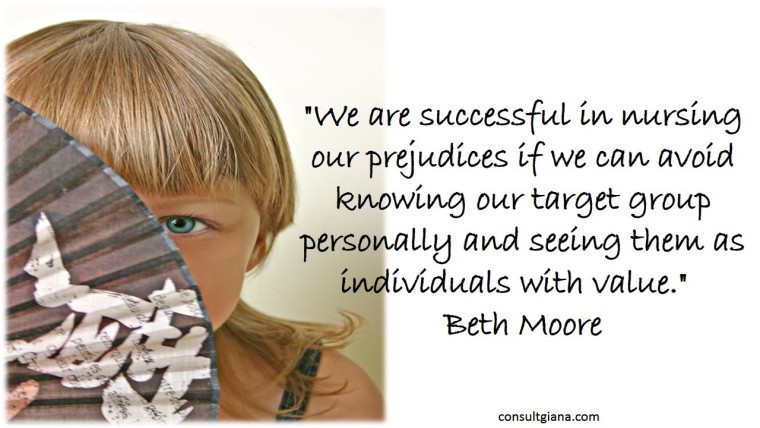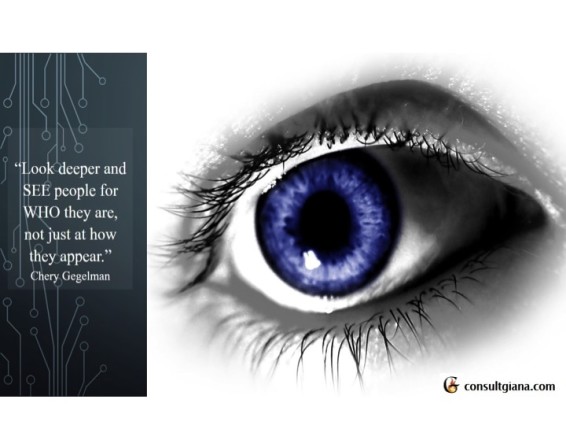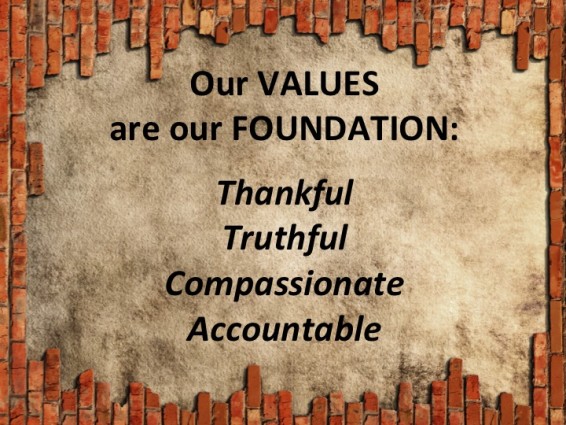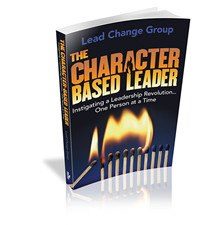When I started Giana Consulting I chose core values that had deep meaning that would be used to guide behavior and decisions.
And then I ranked them in priority order to make the decision process clear.
- It is a core value of my faith
- You can’t solve any leadership or organizational development challenges, until you know the truth about the cause.
- And I see truth as the root of trust.
There is one thing that is common to every individual, relationship, team, family, organization, nation, economy and civilization throughout the world – one thing which, if removed will destroy the most powerful government, the most successful business, the most thriving economy, the most influential leadership, the greatest friendship, the strongest character, the deepest love. …That one thing is trust. – Stephen M.R. Covey
Today character, truth and trust are fasionable buzz words. However in spite of all the buzz…
- Many people see truth as subjective.
- Others don’t see a strong link between truth and trust.
This is how Webster defines truth:
- : the real facts about something : the things that are true
- : the quality or state of being true
- : a statement or idea that is true or accepted as truth
And how Wbster defines trust:
- firm belief in the reliability, truth, or ability of someone or something
During a recent day of pondering I reached out to several leaders and asked them to weigh in on the subject and gave them these questions as thought starters.
[Tweet “How important is truth to you? “]
As a leader? As a follower? As a family member? As a friend?
[Tweet ” Have you ever told a lie or withheld information?”] (And yes taking a cookie from the cookie jar and saying you didn’t counts!)
[Tweet “When did truth become really important to you?”]
[Tweet “How do you discern the truth?”]
[Tweet “Do you hold yourself accountable to speak only the truth? And if so – how?”]
THIS IS WHAT THEY SAID:
How important is truth to me…?
As a leader? Truth is very important to me as a leader. This is because I hold it very tightly to my integrity. If I can’t uphold the truth, how can I expect to lead authentically? But there is an even more important art to master as a leader. And that is to listen (and act) to truth coming from my followers. Being a leader isn’t about being super-human. We make mistakes from time to time. It is accepting that I have failed and making the necessary changes that give truth its credibility.
As a follower? Truth and “followership” are birds of a feather. As a follower, acting and speaking truth enables my leader to believe in me. It becomes easier for them to authentically aid my growth. In return, I get the opportunity to challenge myself out of my comfort zone.
As a family member? Oh! Truth is the cornerstone of my family relationships. It is even more pronounced in this area. Could it be that family is for life? Maybe! Truth helps me to love better. However, I am also careful to speak the truth with love. Truth is not my passport to get back at a family member. I use truth to build them up, not to break them down.
As a friend? Truth is the cement that holds friendships together. Once violated, friendships are broken, many times irreparably. When I feel a friend isn’t holding up to their end of the bargain, it becomes difficult to even share basic information with them. At the moment, I am preparing to end a ‘friendship’ that I thought was based on mutual respect. However, this ‘friend’ has spread untruthful words about something that is nonexistent. The damage has been done. I am willing to walk alone in truth, if that is what it takes.
Have you ever told a lie, a half-truth, or withheld information? (And yes taking a cookie from the cookie jar and saying you didn’t counts!)
The last time I checked, I am still human. I am not perfect. There are many times I have been tempted to withhold truth. In all instances, I can confirm that selfishness was at the front. All because I wasn’t ready to take responsibility for my wrong actions! Being self-centered and truth are like oil and water. They don’t dance very well.
When did truth become really important to you?
I think it goes back as far back as I can remember. As a boy, I vividly recall being given responsibilities beyond my years. I guess it was because I could be trusted. This is another facet of truth. As a follower, I can’t uphold truth if I can’t be trusted.
How do you discern the truth?
It is mostly in the attitude of a person. There are some basic values I hold dear. Once anyone goes against those values, the probability they uphold truth exponentially increases. My wife tells me that I am very intuitive. This is when my gut feeling kicks in.
Do you hold yourself accountable to speak only the truth? And if so – how? Yes I do. There are a number of people that I have welcomed to hold me accountable for my goals, my character and my actions. I have given them permission to ask me difficult questions if need be. Some time back, I fed myself the notion that being accountable to self only can work. What a fallacy!
Telling the truth is not synonymous with being trustworthy.
I live my life under the theory that if you tell the truth, you don’t need to remember who you lied to!
That being said, there are times when not telling the truth is appropriate. Think:
1. Protecting your child from tragic news
2. Lying about how many Jews live in your house when the Nazis come knocking
3. Telling your potential rapist you have an STD
Finally, while it may be fashionable to speak of character, integrity and trust right now, many who speak (and write) about it should find another topic as they fail to “walk their talk.”
What a convicting question!
I’m tempted to pass on the reply, which means that the truth isn’t as important to me as I would like it to be. Often I let people believe things that are only true sometimes. I tend too often to focus on the positive things (and the positive side of negative things) I want you to believe. I have spun things. More than once I’ve been caught and had to admit the distortion I created. Some even very recently.
Often too, I can’t handle the truth. I stepped on the bathroom scale the other day for the first time in a long time and was very disappointed with the truth. Right before I got on the scale, I knew it was a bad idea, but somehow I just had to know. I wanted to line myself up with reality.
When I’m sane, I know the truth is what sets me free. Without it, I become chained to the lies. Every untruth must be supported forever which is too much effort for me. When I’m sane, I embrace my own laziness and choose the truth for simplicity.
I also know lying is a symptom of fear. I don’t like me when I’m afraid. When I’m courageous, I choose the truth because I know I can trust my God who is the Author of all Truth. But the truth is, I’m just not as sane or courageous as I’d like to be.
How do I discern the truth? Generally it is accurate regardless of what I think. If I don’t want to say it, and if I believe it seriously needs to be said, it may be true. As I get older, I realize many of my most negative thoughts are true but unnecessary. The older I get the less necessary my thoughts become.
Finally, I don’t hold myself accountable for the truth as much as I would like. Few people have access to my life and I’m dangerous when un-examined. My biggest challenges are at work, where the lines between my faith and my results are harder to see. I need peers and people who will speak the truth to me so that I never forget the value of truth is and the cost of one lie.
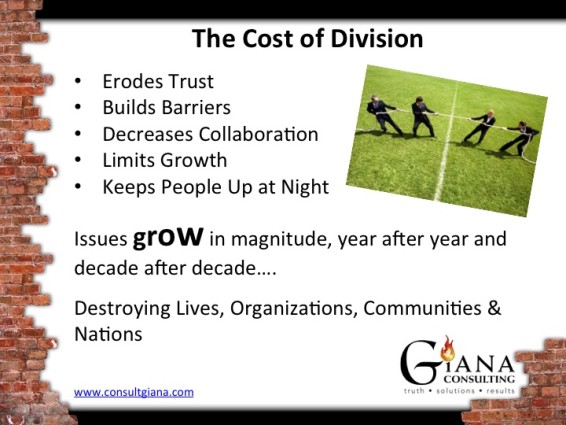
 I live in Charleston, South Carolina. In just a few days this past summer, my heart went from being broken by a senseless crime motivated by hate to being uplifted by people choosing to forgive, not fight or retaliate. Given my awe and respect at how my community handled this tragedy, Chery’s invitation to write about how leaders can limit division and create peace was incredibly serendipitous.
I live in Charleston, South Carolina. In just a few days this past summer, my heart went from being broken by a senseless crime motivated by hate to being uplifted by people choosing to forgive, not fight or retaliate. Given my awe and respect at how my community handled this tragedy, Chery’s invitation to write about how leaders can limit division and create peace was incredibly serendipitous.
